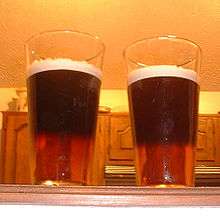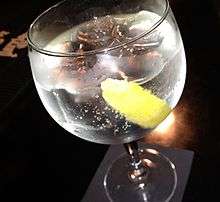Black and Tan
 | |
| A blend of Guinness stout and Bass pale ale | |
| Type | Mixed drink |
|---|---|
| Served | Neat; undiluted and without ice |
| Standard drinkware | Pint glass |
| Commonly used ingredients |
Pale ale or lager and stout or porter |
Black and Tan is a beer cocktail made by layering a pale beer (usually pale ale) and a dark beer (usually stout).
History
The term likely originated in England, where consumers have blended different beers since at least the seventeenth century.[1] The name "black and tan" had earlier been used to describe the coats of dogs, such as the black and tan coon-hound. The earliest recorded usage of the term in the drink context is from 1881, according to the Oxford English Dictionary, in the American magazine Puck.[2] The first recorded British use of the term to describe a drink is from 1889.[2]
Preparation
The "layering" of Guinness on top of the pale ale or lager is possible because of the lower relative density of the Guinness.[1] The opposite scenario (where the layer on top is heavier than bottom) would produce the fluid mechanics phenomenon known as the Rayleigh-Taylor Instability.
To prepare a Black and Tan, fill a glass halfway with pale ale then add the stout. The top layer is best poured slowly over an upside-down tablespoon placed over the glass to avoid splashing and mixing the layers. A specially designed black-and-tan spoon is bent in the middle so that it can balance on the edge of the pint-glass for easier pouring.[1] Alternatively, the stout can be poured first so that the drinks are thoroughly mixed together.
Several American breweries currently make premixed Black and Tan, for example Yuengling's Original Black and Tan.[1]
Controversy
The name "Black and Tan" is not used in Ireland as a term for a mixture of two beers. The drink is instead referred to as a half and half.[1] Indeed, the drink has image problems in Ireland and elsewhere due to the association with the excessively violent Royal Irish Constabulary Reserve Force, nicknamed the "Black and Tans", which was sent into Ireland in the early 1920s.[1] As a result, in Ireland the name is seen as contentious and disrespectful.[3]
In March 2006, Ben and Jerry's released an ice cream flavour in the United States for Saint Patrick's Day inspired by the drink; the name offended Irish nationalists because of the paramilitary association. Ben and Jerry's has since apologised. A spokesman told Reuters, "Any reference on our part to the British Army [sic] unit was absolutely unintentional and no ill will was ever intended."[4] In March 2012, the drink's name once more came into the news when Nike, as part of an Irish themed set of designs, released a pair of shoes advertised as the "Black and Tan" and generating offence similar to the earlier Ben and Jerry's ice cream.[5]
See also
References
- 1 2 3 4 5 6 Oliver, Garrett (2011). The Oxford Companion to Beer. New York: Oxford University Press. p. 135. ISBN 978-0-19-536713-3. OCLC 706025045.
- 1 2 "black and tan". Oxford English Dictionary. (subscription required)
- ↑ McKittrick, David (21 April 2006). "Ireland's War of Independence: The Chilling Story of the Black and Tans". The Independent. London. Retrieved 10 August 2015.
- ↑ Peterkin, Tom (21 April 2006). "Black and Tan Ice Cream Causes a Chill in Ireland". The Daily Telegraph. London. Retrieved 10 August 2015.
- ↑ Boyd, Brian (10 March 2012). "Nike Puts Its Foot in It with 'Black and Tan' Sneaker". The Irish Times. Dublin. Retrieved 10 August 2015.
